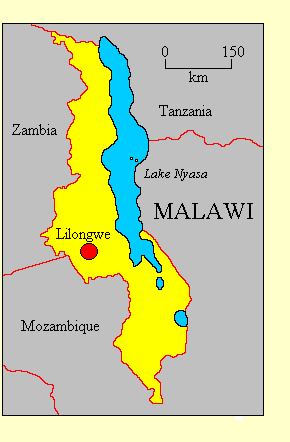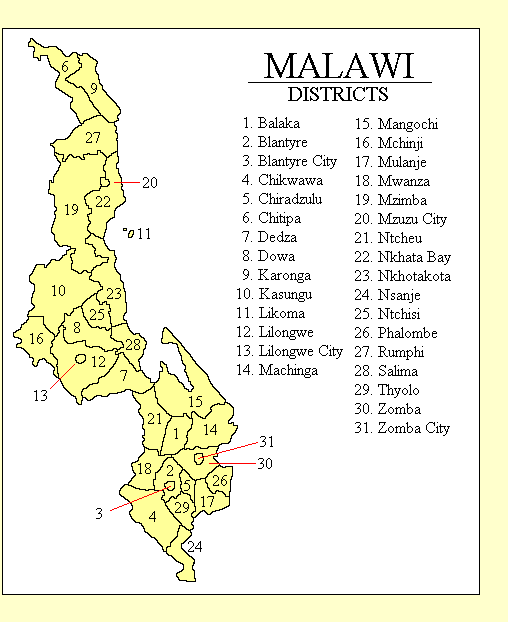
REPUBLIC OF MALAWIOfficial name: Dziko la Malawi / Republic of Malawi
In 1953 Nyasaland was incorporated into the white-ruled Federation of Rhodesia and Nyasaland, but the NACP leader, Dr Hastings Banda, refused to accept this. In 1961 Banda's party, now called the Malawi Congress Party, won a majority of seats in the Nyasaland legislature on a policy of independence, which followed in June 1964. 
Since there were no other parties in the country, Malawi became a one-party state by default, and this was formalised in 1966. In 1970 Banda declared himself President For Life, and his regime grew more authoritarian as he grew older. Finally he was deposed in 1994, aged about 96. Free elections were then held under a new constitution, and Bakili Muluzi was elected President. He was re-elected in 1999, and was peacefully succeeded by Bingu wa Mutharika in 2004. The major political parties in Malawi are the President's Democratic Progressive Party (DPP) and the former ruling party, the Malawi Congress Party. (MCP). Mutharika's former party, the United Democratic Front, has lost most of its support since he departed after falling out with former President Muluzi and founded the DPP. At the 2009 election Mutharika was easily re-elected and the DPP won a large majority in the National Assembly. Freedom House's 2009 report on Malawi says: "Malawi is an electoral democracy, [but] elections in Malawi have been characterised by significant tension and occasional violence by police or party thugs. While generally free from overt manipulation, recent elections were marked by irregularities and bias by the electoral commission in favor of the government... Mutharika has claimed that fighting corruption is a top priority. However, the opposition and civil society groups have charged that the effort has been directed primarily at Mutharika's political opponents... The World Bank in 2006 noted that Malawi had failed make significant progress on controlling corruption, and the Bank's Governance Indicators since then show no improvements in this respect. Malawi was ranked 115 out of 180 countries surveyed in Transparency International's 2008 Corruption Perceptions Index... Freedom of the press is legally guaranteed. Despite occasional restrictions, Malawi's dozen or so newspapers present a diversity of opinion. The government controls the only television station in the country... The government generally upholds freedoms of association and assembly. However, since 2007, the UDF and Muluzi loyalists have had difficulties holding rallies... Many nongovernmental organizations - including the constitutionally mandated Malawi Human Rights Commission (MHRC) - operate without interference... The generally independent judiciary has become embroiled in political disputes and faces government hostility." Updated March 2010 |
